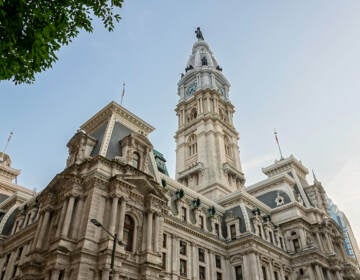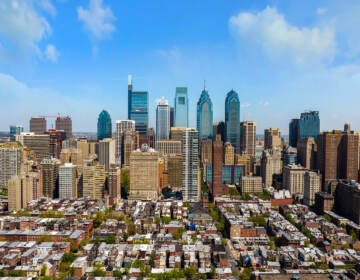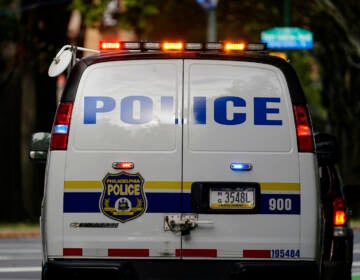Philly facing $450M budget shortfall; officials eye cuts, taxes, and privatization
After a bruising pandemic year, the city faces a steep budget shortfall. Service cuts, tax hikes, and privatization or sale of city assets are on the table.
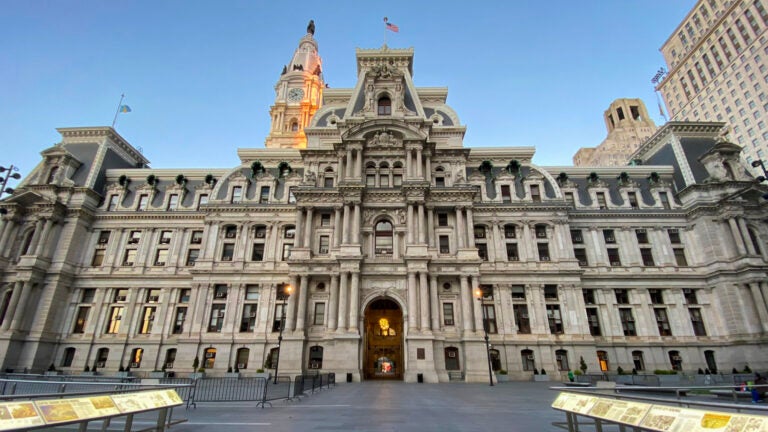
Philadelphia City Hall. (Danya Henninger/Billy Penn)
Philadelphia is staring down an estimated half-billion dollar budget hole after a bruising pandemic year — and officials say steep budget cuts are a near certainty.
City Hall budget officials said the city is facing $5.1 billion in costs through the next fiscal year to maintain current spending and services. But reduced tax collections and the exhaustion of one-off relief grants mean revenue is currently projected to come in at $4.6 to $4.7 billion, with city economists forecasting a likely $450 million shortfall.
Budget Director Marisa Waxman said that while city revenues had begun to tick back up, they were still far short of pre-pandemic levels, with about two months to go before the city unveils its next annual budget. And, at the same time, she said, critical expenditures like homeless services and insurance costs had increased.
“Our revenues are not bouncing back the way we would have hoped,” she said.
The city already made steep cuts in 2020 as the initial COVID-19 shutdown hammered finances while also exhausting much of its $290 million cash balance. Finance Director Rob Dubow said the city expected to have just $29 million going into the next fiscal year — the equivalent of about three days of municipal spending — although they hoped to increase that figure.
“We’ve pulled down on our reserves and they’re essentially gone,” he said. “The challenges this year are at least as bad as last year.”
City officials offered few details on how they hoped to fill depleted city coffers. President Joe Biden’s administration has pitched $350 billion in relief for state and local governments as part of a proposed $1.9 trillion stimulus package. However, the issue of municipal bailouts has proven controversial in Congress, and Waxman said the city likely faced a battery of long-term fiscal challenges — including worrying public school finances — that were unlikely to be patched solely by more one-off funding.
“Even with federal stimulus, cuts are going to be needed,” Waxman said.
Only about 47% of the city’s budget is truly discretionary, and around a quarter of the budget is tied to fixed costs. Officials said that few programs cut last year would be restored, although the city committed to using a “racial equity lens” to guide any additional reductions.
“It’s unlikely to be a flat cut for every department,” Waxman said.
She said officials were lobbying for federal and philanthropic aid while the city mulled service reductions, tax hikes, and even privatization or sale of city assets to close the gap.
Activist groups have also organized for years to pressure the many large nonprofits operating in the city and exempt from certain levies to commit to payments in lieu of taxes, or “PILOTs,” to help relieve earlier strain on the budget.
The University of Pennsylvania, in November, independently committed to a $100 million multi-year contribution to the School District of Philadelphia. The donation aims to help the public school system remediate hazards in buildings such as asbestos and lead. City leaders and activists had hoped the donation might spur other institutions to give, but that has not materialized.
Protesters spurred by the killing of George Floyd and other instances of police brutality have also repeatedly called for police funding to be reduced and redistributed to other city services — although a skyrocketing homicide rate will likely make the latter a political minefield.
But officials ultimately gave few details on what might be on the chopping block or specific revenue strategies they were looking at to close the gap.
“We are really early in our discussions and we haven’t gotten into specific discussions,” Dubow said. “Everything is on the table.”

Subscribe to PlanPhilly
WHYY is your source for fact-based, in-depth journalism and information. As a nonprofit organization, we rely on financial support from readers like you. Please give today.




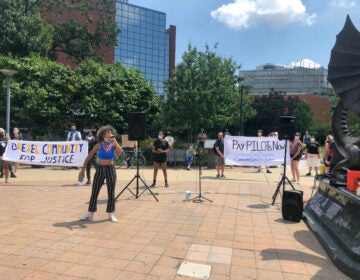

![CoronavirusPandemic_1024x512[1]](https://whyy.org/wp-content/uploads/2020/03/CoronavirusPandemic_1024x5121-300x150.jpg)
